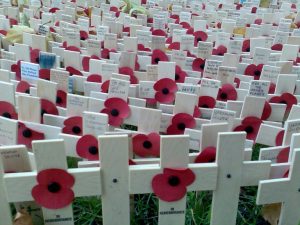
For Key Stages 1-5, the RBL’s free teaching kits include downloadable assemblies, a whole school project, and book club stories to use at school and home
The Royal British Legion, together with the National Literacy Trust, has launched a new range of free teaching Remembrance resources to help children and teenagers understand the importance of Remembrance and its relevance to all of us today.
For 100 years Remembrance has reminded us of our shared history and the Legion’s new teaching resources will enable students from all backgrounds and communities to learn about the service and sacrifice of past and present generations. Designed for use in school and at home, pupils can discover how Britain’s national Remembrance traditions have evolved, engage in different community and national commemorations, and be encouraged to imagine what Remembrance might look like for them in the future.
Strengthening an existing line of Remembrance resources, the RBL’s 2021 teaching kits include new assembly plans, whole school projects and stories featuring award-winning authors Terry Pratchett and David Olusoga, each coming with helpful notes for parents and educators. The academic resources will enable students to learn how the poppy has become an enduring symbol of support for our Armed Forces, and can also be used in school assemblies to observe the two-minute silence on 11th November.
Available in English and Welsh, the resources for Key Stages 1-5 are linked to the national curriculum to develop core reading skills and are differentiated for students depending on their age, interests, and ability.
Catherine Davies, Head of Remembrance at The Royal British Legion says:
“The RBL’s new Remembrance teaching resources will help children to understand why people of all faiths, cultures and backgrounds come together to remember the service and sacrifice of the Armed Forces community. For 100 years Remembrance has been part of the fabric of society and teachers can use these lessons, activities and assemblies to show the next generation why we remember not only those from past conflicts, but those who continue to protect us today.”
Fay Lant, Head of School Programmes at the National Literacy Trust, says:
“We are proud to have developed a variety of new teaching resources for schools and parents that offer a range of creative, engaging ways to mark Remembrance. Whether it’s taking part in the book club with stories from authors including Terry Pratchett and David Olusoga, or working with everyone in your school to develop a unique audio time capsule, there’s an activity to get everyone involved in Remembrance.”
The Royal British Legion’s free Teaching Remembrance resources can now be downloaded on the RBL’s website here: www.rbl.org.uk/teachingremembrance.
The latest Teaching Remembrance Resources include:
- KS5 Understanding Remembrance Assembly
After the success of the KS1-4 Understanding Remembrance assemblies, the RBL has extended the reach of these popular assemblies to KS5 (16-18 years old). These are evergreen resources designed to introduce children to who, how and why we Remember.
- KS1-5 2021 Remembrance Assemblies
The Remembrance assemblies engage children in Remembrance through a relevant and accessible annual narrative. In 2021 children and teenagers can explore 100 years of Remembrance through videos of veterans and civilians, learning that Remembrance honours all those who help to protect us.
- KS3 Remembrance Book Club stories
The book club engages children in Remembrance using a storytelling format that children are familiar with at school. The narratives demonstrate that the experiences of others, whether fictional or real, are relevant to our lives today. The book club is based on extracts from a range of authors including Terry Pratchett, Lucy Strange, David Olusoga, Liz Kessler, Tony Bradman, Phil Earle and Elizabeth Wein.
The texts explore a range of topics including the experiences of Jewish children in the Second World War, the contribution of African and West Indian people to the war effort and rebuilding of Britain, and the impact of serving in Afghanistan on two brothers. A teacher guide and activity sheets for each extract are also included, featuring discussion questions and glossaries.
- Primary Whole School Project
The RBL’s new Sounds of Remembrance project for primary schools sees children work towards creating an audio time capsule which records the ways people in their community take part in Remembrance. Through a series of sessions children can learn how our national Remembrance traditions have evolved, discuss different community and national Remembrance traditions, and imagine what Remembrance might look like for them in the future.